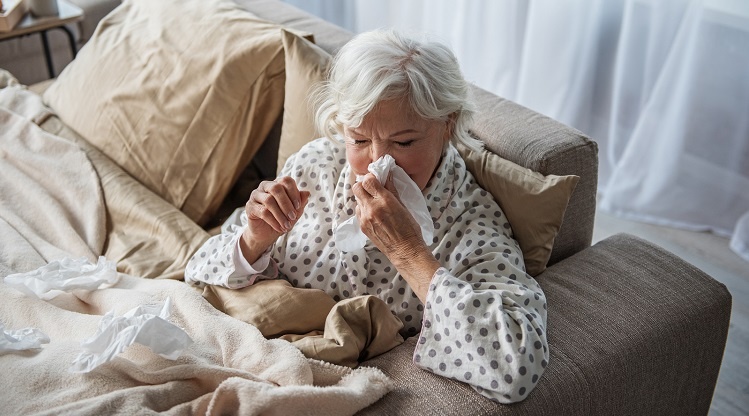Cold weather brings more time spent indoors and surges of seasonal infections, like the flu. Flu season is a frustrating time of year, no matter how old you are, but it can be particularly troublesome for seniors. And flu season may never quite be the same since the pandemic of COVID-19. Learn how to prepare for flu season to help seniors stay healthy!
Seniors At Risk
Seniors are particularly vulnerable to catching the flu because, as we age, our immune response becomes weaker. It becomes harder for the body to fight off infections and illnesses. This means that people 65 years of age or older are more likely to get the flu than younger generations.
It isn't only the flu itself that seniors need to be concerned with. There are many flu-related issues that seniors need to guard themselves against. Having the flu can aggravate medical conditions they already have, including:
- Diabetes
- Asthma
- Congestive heart failure
Since a senior's immune system is less responsive, they are also more likely to develop complications to the flu, including:
- Dehydration that can be severe
- Bronchitis
- Pneumonia
- Seizures
And if that weren't enough, seniors who get the flu may even be more likely to have a heart attack. These complications can require hospitalization and even result in death. In fact, 70% to 85% of seasonal flu-related deaths occur in the senior age group, and this group accounts for 50% to 70% of flu-related hospitalizations.
Because of these health risks, it's important that seniors take preventative measures this season and to see a doctor as soon as possible if they notice any symptoms.
Flu + COVID-19
The flu and COVID-19 are both contagious respiratory illnesses, according to the CDC. However, they are caused by different viruses. While COVID-19 spreads faster and individuals may remain asymptomatic, it can still be difficult to distinguish between the two.
For example, they exhibit similar symptoms, including fever, cough, congestion, sore throat, runny nose, and more. If you or a loved one exhibits these symptoms, it’s important to see a doctor as soon as possible and to begin self-quarantining. A test for the flu or for COVID-19 is the only way to determine what the illness is.
There are many new variables to consider this flu season because of COVID-19. To start with, many individuals aren’t getting their regular flu shot. Another variable to note is how fast symptoms appear. For the flu, usually a person develops symptoms between 1 and 4 days from being exposed to the infection. On the other hand, COVID-19 symptoms manifest themselves anywhere from 2 to 14 days after exposure. If you notice symptoms, see a doctor right away. There are medications that can treat the flu or help reduce the severity of symptoms within the first 48 hours!
Hospital capacity is another variable to consider. Severe flu cases can result in hospitalizations, and right now, the hospitals are already reaching capacity with COVID-19 cases. As a result, hospitals could become even more overloaded during this season.
Flu Prevention
Fortunately, there are also ways for seniors to lessen their chances of contracting the flu. Here are a few preventative measures seniors can take. Remember that none of these suggestions is foolproof, and your loved one may still contract an illness; however, these guidelines can greatly reduce their risk of infection.
- Get enough rest. For seniors, sleep is even more critical because it helps us rebuild cells and keeps our immune system in tiptop shape.
- Drink enough fluids and maintain a balanced diet. This can help keep your immune system ready to fight off infection.
- Wash your hands to prevent the flu from spreading. Washing your hands can significantly reduce your likelihood of getting sick. Make sure to wash your hands for 20 seconds and scrub every inch of your hands.
- Get a flu vaccine this year. The vaccine may not completely prevent the flu, but it can help reduce the severity of symptoms if your loved one does get the flu. Additionally, seniors over 65 should also get their pneumococcal vaccinations.
- Continue protecting yourself from COVID-19. Seniors should limit their contact with others and reduce their exposure to COVID-19. This includes sanitizing surfaces frequently, remaining at home, wearing a face mask, social distancing, etc. Many of these precautions can also help prevent the flu.
Flu season can be scary. But don't make it more frightening than it needs to be. With a little knowledge and a lot of prevention, you and your loved ones can stay healthy.
For more information on how to stay healthy, check out our free resource on reducing infection: Caregiver Infection Control Checklist. We offer a wide range of tips that you can use to help cut down on the spread of infection, whether it’s the flu or COVID-19. Access our content library of free resources by first finding your local Caring office.


